|
|
|
Sort Order |
|
|
|
Items / Page
|
|
|
|
|
|
|
| Srl | Item |
| 1 |
ID:
153079
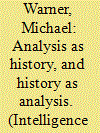

|
|
|
|
|
| Summary/Abstract |
History is something far from storytelling about the past; it has its own methods, discipline, techniques, and value. The same can be said about intelligence analysis, which is a comparative newcomer to the professions. Like historians, analysts seek to gather information, evaluate their sources, create meaning from disparate bits of evidence, and impart significant findings. These considerations make it important for analysts to learn their history and how the discipline of history functions. A greater ‘historical sense’ can make analysts more rigorous in their work, and less likely to be frustrated by the situations they see around them.
|
|
|
|
|
|
|
|
|
|
|
|
|
|
|
|
| 2 |
ID:
004518
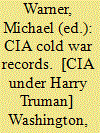

|
|
|
|
|
| Publication |
Washington, DC, Central Intelligence Agency, 1994.
|
| Description |
XLVii,473p.
|
|
|
|
|
|
|
|
|
|
|
|
Copies: C:1/I:0,R:0,Q:0
Circulation
| Accession# | Call# | Current Location | Status | Policy | Location |
| 035314 | R 327.12/WAR 035314 | Main | On Shelf | General | |
|
|
|
|
| 3 |
ID:
116170
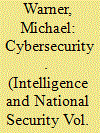

|
|
|
|
|
| Publication |
2012.
|
| Summary/Abstract |
The 'cyber' issue is not new, but rather has taken a half-century to develop. Indeed, it was already decades old before the general public and many senior leaders recognized its salience in the mid-1990s. It developed, moreover, along a logical path, which can be depicted as the successive dawning (for American policymakers, officials, and intelligence officers) of four insights, each of which was glimpsed in theory at least shortly before empirical evidence verified that it was indeed a reality to consider in setting policies, standards, and doctrine. Thus the official responses to the emergence of the cyber issue in the late-1990s were shaped by the outcomes of those earlier debates; the options available to policy-makers in the White House, Congress, the Pentagon, and the various agencies were already conditioned and even determined by previous arguments.
|
|
|
|
|
|
|
|
|
|
|
|
|
|
|
|
| 4 |
ID:
125096


|
|
|
|
|
| Publication |
2013.
|
| Summary/Abstract |
PRESIDENT BARACK Obama has identified cybersecurity threats as among the most serious challenges facing our nation. Secretary of Defense Chuck Hagel noted in April that cyberattacks "have grown into a defining security challenge." And former secretary of defense Leon Panetta told an audience in 2012 that distributed denial-of-service attacks have already hit U.S. financial institutions. Describing this as "a pre-9/11 moment," he explained that "the threat we face is already here." The president and two defense secretaries have thus acknowledged publicly that we as a society are extraordinarily vulnerable. We rely on highly interdependent networks that are insecure, sensitive to interruption and lacking in resiliency. Our nation's government, military, scientific, commercial and entertainment sectors all operate on the same networks as our adversaries. America is continually under siege in cyberspace, and the volume, complexity and potential impact of these assaults are steadily increasing.
|
|
|
|
|
|
|
|
|
|
|
|
|
|
|
|
| 5 |
ID:
073650
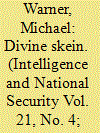

|
|
|
|
|
| Publication |
2006.
|
| Summary/Abstract |
Scholars of ancient China and students of military strategy have devoted considerable attention to Sun Tzu's The Art of War. Intelligence experts, in contrast, occasionally cite his chapter on 'The Use of Spies' but do not seem to engage his text. Part of the problem is the difficulty of translating his oracular adages; Western experts in Chinese history rarely understand the arcana of espionage, while intelligence scholars usually know no Chinese. Sun Tzu amply repays an effort to study his text, however, as he presents one of the oldest extant descriptions of an intelligence system - one that is, moreover, still insightful in our modern age.
|
|
|
|
|
|
|
|
|
|
|
|
|
|
|
|
| 6 |
ID:
089635
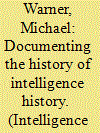

|
|
|
|
|
| Publication |
2009.
|
| Summary/Abstract |
Intelligence historians long worked in the manner of antiquarians, painstakingly piecing together lost worlds from pottery fragments, scaps of manuscripts, and faded inscriptions on broken steles. Today matters have improved for antiquarians and intelligence historians alike. Scientific excavations of thousands of sites tell us how people once lived in them; genealogy can finally tell us who those people were. Intelligence historians, meanwhile, profit from the spreading declassification of originally top-secret documents and gain a better sense of historic intelligence agencies and operations as a whole.
|
|
|
|
|
|
|
|
|
|
|
|
|
|
|
|
| 7 |
ID:
113405
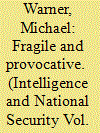

|
|
|
|
|
| Publication |
2012.
|
| Summary/Abstract |
Students of international relations should seek to understand the ways in which power in international relations can be amplified by secrecy. Discussions of 'decision advantage' over rival states have explained information asymmetries and means for competitors to gain advantages by keeping secret their sources of information or the special insights they gain even from information that is widely available. The histories of war, diplomacy and intelligence illuminate such advantages, and also show various ways in which secrecy amplifies 'action' advantages as well as 'information' advantages. That amplification often seems to be accomplished by the same people and organizations, and this essay suggests the prime reason for this common institutional co-location of secret functions can be termed the 'economy of secrecy'. The key to grasping this point is to set aside traditional and academic distinctions between knowledge and action, and information and implementation, when viewing the moves of sovereignties. Sovereign leaders opt to co-locate their secret activities when they judge it too risky (e.g. potentially expensive and dangerous) to distribute secret-information and secret-action functions around too many different offices. The handful of subordinates that receive these functions are what we now call 'intelligence agencies.' Finally, a firmer grasp of the economics of secrecy can improve oversight of secrets and the offices that deal with them.
|
|
|
|
|
|
|
|
|
|
|
|
|
|
|
|
| 8 |
ID:
113401
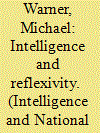

|
|
|
| 9 |
ID:
089627
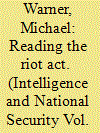

|
|
|
|
|
| Publication |
2009.
|
| Summary/Abstract |
The difficulty of satisfying competing needs of both national and sub-national officials and commanders for intelligence support capabilities that are too sensitive and expensive to duplicate for both sets of requirements emerged with the growth of industrial-scale imagery and signals intelligence assets and production during the Cold War. The literature of intelligence history and intelligence studies covers the symptoms of this problem, but says less a rigorous and well-documented nature on its causes. Thanks to recent declassifications in the United States, however, we can now read key documents in an American attempt to understand and deal with the dilemma. A study prepared for President Richard Nixon in 1971 and now dubbed the 'Schlesinger Report' has been published virtually intact by the US Department of State. In addition, the Central Intelligence Agency has released two official histories which indirectly have added significant detail to the story. With these new releases, it is now possible to explain the genesis of the Report and chart its effects through the remainder of President Nixon's presidency. The Schlesinger Report marked a watershed for the intelligence community, helping the Nixon Administration to conceive and enact reforms that were both consequential in themselves and presaged the findings of later surveys and inquiries. A better understanding of the Report's background, text, and results can shed light not only the policymaking process in the Nixon Administration but also the trajectory of the intelligence community - and of foreign intelligence establishments that may, in some respects, be following in its path.
|
|
|
|
|
|
|
|
|
|
|
|
|
|
|
|
| 10 |
ID:
111186
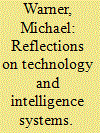

|
|
|
|
|
| Publication |
2012.
|
| Summary/Abstract |
The impact of individual technological innovations on intelligence operations is often discussed, but the influence of technological change per se on intelligence systems remains less well understood. The historical literature on this topic is uneven - filled with detailed narratives on certain aspects, but also with surprisingly little attention to larger trends and their meaning. This is significant for two reasons. First, it means we have an incomplete understanding of what happened in the past, particularly for the 'analog revolution' in intelligence in the twentieth century. Second, it leaves us with few clues for understanding another wave of technological change washing over the intelligence profession at this time (a 'digital revolution'). Looking at the second revolution in the light of the first can give us important clues to what to watch for in coming years.
|
|
|
|
|
|
|
|
|
|
|
|
|
|
|
|
| 11 |
ID:
101125
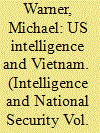

|
|
|
|
|
| Publication |
2010.
|
| Summary/Abstract |
Recent declassifications of the official histories of Central Intelligence Agency and National Security Agency activities in the Vietnam War give historians a sharper outline of the overall American intelligence effort in that conflict and a trove of supporting details. While scholars will have to use the new releases with caution, the histories (when combined with appraisals from the Armed Services) offer glimpses of the scale of the US intelligence program and some of the complications that hindered its effectiveness. Two particular features stand out when these materials are viewed in conjunction: the disconnectedness of the various agencies' and Services' efforts from each other (and from decision makers in Washington); and the difficulties that all of them had in working with America's South Vietnamese allies. The picture emerging is thus one of a congeries of largely independent intelligence campaigns working simultaneously against the North Vietnamese and Viet Cong targets. Intelligence miscues did not lose the Vietnam War for the Americans and South Vietnamese, but it now seems clearer that they made victory less likely.
|
|
|
|
|
|
|
|
|
|
|
|
|
|
|
|
| 12 |
ID:
006640
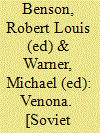

|
|
|
|
|
| Publication |
Washington DC, Central Intelligence Agency, 1996.
|
| Description |
xxxiv, 450p.
|
|
|
|
|
|
|
|
|
|
|
|
Copies: C:1/I:0,R:0,Q:0
Circulation
| Accession# | Call# | Current Location | Status | Policy | Location |
| 038355 | 327.1247/BEN 038355 | Main | On Shelf | General | |
|
|
|
|
|
|
|
|
|